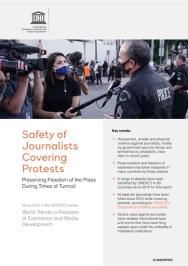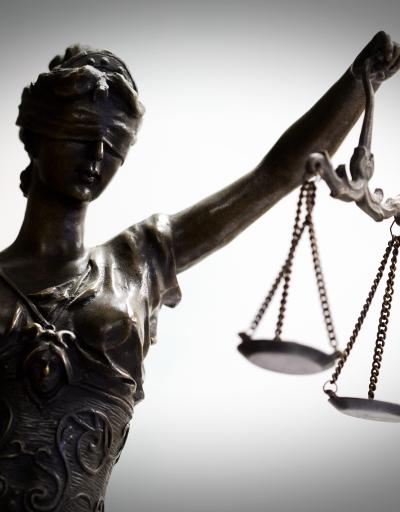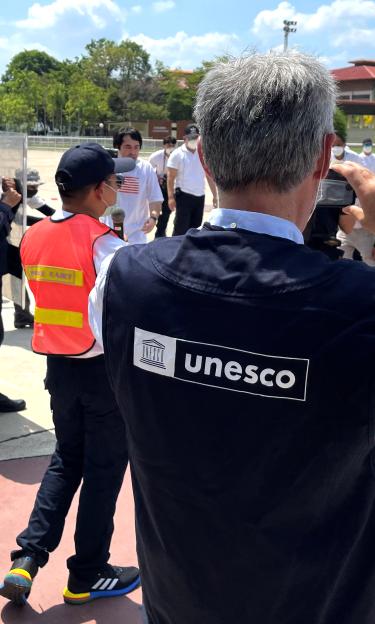Training of Law Enforcement agents
Security forces can play an enabling role in situations of political and institutional change toward democratic societies, post-conflict situations as well as countries experiencing high levels of violence or instability. Building enhanced professional relationships between security forces and the media can also help keep the population informed during critical periods such as elections, and public demonstrations.
Since 2013, UNESCO and its partners have trained over 12,500 security forces on these issues globally. UNESCO’s training programmes targeting members of law enforcement and security forces, are being implemented both online and on-the-ground, at a global scale. The primary aim is to provide these key actors within the law enforcement systems with practical and theoretical tools to carry out their mission of maintaining public order and upholding the rule of law, while respecting international human rights and standards on freedom of expression and the safety of journalists.
Impact
UNESCO and its partners have been implementing training programmes for security forces based on the Training Manual on “Freedom of Expression and Public Order”. Through national trainings, over 11,500 security forces have been trained in more than 25 countries around the world including Burkina Faso, Colombia (by FLIP), Côte d'Ivoire (and in 2020, in context of elections), Democratic Republic of Congo, Ethiopia, Ecuador, Gabon, the Gambia, Guinea Bissau (and in 2023, a second training), Indonesia, Iraq (and in 2021, training for female police officers), Libya, Madagascar, Mali (with OHCHR), Mexico, Palestine, Rwanda, Senegal (with OHCHR), Somalia (and in 2023), South Sudan, Tanzania (with UNDP), Tunisia, Ukraine, Uzbekistan, Thailand and Philippines.

UNESCO has also conducted three regional trainings for security forces in Africa (held in Kenya with 11 countries participating including Cameroon, Ghana, Kenya, Mauritius, Namibia, Nigeria, Somalia, South Sudan, Tanzania, Zambia and Zimbabwe), Latin America (held in Colombia with 13 countries participating including Argentina, Bolivia, Chile, Colombia, Costa Rica, Honduras, Ecuador, El Salvador, Mexico, Panama, Paraguay, Peru and the Dominican Republic), and in Europe (Training of Trainers workshop in Germany with police trainers and representatives from 8 countries including Albania, Armenia, Bosnia and Herzegovina, Georgia, Greece, Montenegro, Ukraine and Uzbekistan).
Moreover, UNESCO has also established a partnership with the International Police Association to strengthen the capacities of security forces and raise awareness on their role to guarantee freedom of expression and safety of journalists. An online course was jointly launched , from 11 July to 18 August 2022) and engaged over 3,200 members of police and law enforcement agencies, judicial actors, and journalists from 130 countries.
Police and journalists are not enemies; we must generate mutual respect based on empathy. We are essential protagonists in democratic life
Security forces can enhance professional relations with the media.
Since 2013, UNESCO and its partners have trained over 11,500 security forces with practical and theoretical tools to carry out their mission of maintaining public order, while respecting international human rights and standards on freedom of expression and the safety of journalists.
2023 Trainings
List of trainings for security forces in 2023
- 15-17 March - Training for law enforcement agents in Mexico
- 22-24 March & 27-29 March - Training for law enforcement agents in Guinea-Bissau
- 3-6 April - International Training for Security forces in Germany, in cooperation with the International Police Association, IBZ Castle Gimborn and Free Press Unlimited
- April - Training for law enforcement agents in Iraq
- 1-3 May - Training for law enforcement agents in Somalia
- June - Training for law enforcement agents in Democratic Republic of Congo
- 4 - 8 September - Training for security forces in Namibia
2022 Trainings
List of trainings for security forces held on 2022
- 25 officers from the Philippine National Police - 4-6 April 2022
- 31 police officials in cooperation with the Ethiopian Police University - 11 - 14 April 2022
- 30 police officials and trainers of Thailand's Royal Police Cadet Academy - 19-22 April 2022
- Police officers from Gabon's Forces de Défense et de Sécurité - 6 -8 September 2022
- 25 high- and middle-ranking law enforcement officers, including trainers of police academies, in Bogor Indonesia - 4-6 October 2022.
- 25 police officers from different units in Surabaya, East Java, Indonesia - 29 November - 1 December 2022
- Regional high-level training-of-trainers for security forces from 11 countries across Africa, Nairobi, Kenya – 16-18 November 2022
- National training workshops (on-site and online) in Ecuador - November 2022
- Regional training of trainers’ workshop for high-ranking police officers and trainers of police academies from 13 countries across Latin America and the Caribbean - 23-26 November 2022
- 60 police officers in the Democratic Republic of Congo (DRC) - 23 November -7 December 2022
- Training for police officers and trainers from the Philippine National Police Academy - 5-7 December 2022
Publications and resources
UNESCO offers resources on international standards on freedom of expression for law enforcement agents.








